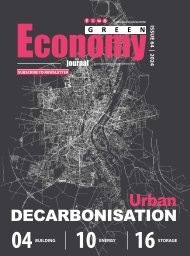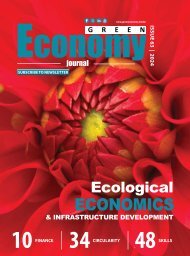Green Economy Journal Issue 48
You also want an ePaper? Increase the reach of your titles
YUMPU automatically turns print PDFs into web optimized ePapers that Google loves.
AGRI-FOOD<br />
AGRI-FOOD<br />
FOOD SECURITY IN SOUTH AFRICA<br />
PEOPLE, PLANTS<br />
AND PLANET<br />
READ REPORT<br />
[ECO]NOMIC THOUGHT<br />
greeneconomy/the upshot<br />
Covid-19 and the Food Safety/Environment Dilemma<br />
Tetra Pak Index 2020<br />
Covid-19 is the number one concern for consumers worldwide, evidenced in recent global<br />
research. Against this backdrop, economic worries have seen a sharp upturn, reflecting<br />
widespread uncertainty about the impact of the pandemic on the economy.<br />
Food safety has quickly moved up the list of consumer priorities and is now seen as a major<br />
issue for society. Consumers believe that improving food safety is not only the responsibility<br />
of manufacturers, it needs to be their priority. Consumers are looking for transparency and<br />
reassurance that this priority is being addressed. Many want to know everything they can<br />
about a product’s provenance and production process – highlighting a communication<br />
opportunity for brands.<br />
Concern for the environment remains strikingly powerful. More than two-thirds of consumers<br />
believe that we must change our habits quickly to mitigate further environmental impact. In this<br />
context, sustainable packaging remains key, rated a top expectation from manufacturers.<br />
[Excerpt from foreword]<br />
08 19 30 35 39<br />
The changing<br />
interplay between<br />
food safety and<br />
environment<br />
Food waste is<br />
rising up the<br />
agenda<br />
Sustainable<br />
packaging<br />
matters<br />
Convergence<br />
is on the<br />
increase<br />
Factors<br />
influencing<br />
the future of<br />
packaging<br />
Our country is grappling with the challenge of how to enhance the resilience of food<br />
systems to deal with sudden shocks like the pandemic and ongoing stresses like climate<br />
change. Meanwhile, hunger persists despite high agricultural productivity that should<br />
support every citizen’s nutritional needs.<br />
THE CREAM OF THE CROP: Agriculture economy<br />
BY MELISSA MOORE, FUTUREGROWTH ASSET MANAGEMENT<br />
South Africa has a highly diversified, market-oriented agricultural<br />
sector that extends across various product ranges. Overall<br />
agricultural GDP growth is 13.1% year-on-year (relative to a<br />
7% economic contraction for the country as a whole). This<br />
outperformance is underpinned by high levels of agricultural output<br />
following favourable production conditions; high commodity prices;<br />
strong export demand and a favourable rand exchange rate.<br />
FUNDAMENTAL FACETS<br />
1. VOLATILITY. Instability influenced by climate and social change.<br />
• Variable weather conditions and climate change cause a fluctuation<br />
in yields, which impacts the local and global supply dynamics. This<br />
creates volatility in volumes and crop prices.<br />
• Geopolitical influences and government actions:<br />
o Global supply and demand pressures emerge when governments<br />
take actions to subsidise production or when they ban exports due<br />
to concerns about domestic supplies. The US-China trade tensions<br />
were a source of volatility for certain agricultural commodities.<br />
o Locally, policy uncertainty around land expropriation has had an<br />
impact on the ability to access capital investment in the sector.<br />
o Changing consumer preferences.<br />
2. COMPLEXITY. Agriculture is not homogenous. There are different<br />
crops and food types, each with their unique and fragmented<br />
28<br />
supply chains. There is diversity within each crop, in terms of how,<br />
where and by who it is produced. The complexity is intensified by<br />
environmental factors that influence regional and yearly production.<br />
3. SCRUTINY. Role players in the agriculture and food value chain are<br />
under pressure to improve the traceability of the food we eat.<br />
Agriculture that prioritises maximum<br />
productivity by exploiting natural<br />
resources will prevent us from meeting<br />
our growing demand for food and fibre<br />
on a sustainable basis.<br />
Notwithstanding these complexities, agriculture is widely anticipated to<br />
be a vital driver of economic growth worldwide. Within a troubled global<br />
economy, the agri-food value chain sectors remain a strong outlier, driven<br />
by population growth, urbanisation and the rise of the middle class.<br />
EXPORTS ON THE UP<br />
The South African agricultural sector remains a net exporter, with<br />
exportable volumes of various commodities growing annually. In 2020,<br />
South Africa’s agricultural exports hit $10.2-billion, a 3% increase from<br />
the prior year and the second largest level on record. Simultaneously,<br />
agricultural imports fell 8%, leading to a 26% annual increase in the<br />
agricultural trade surplus, which widened to $4.3-billion in 2020.<br />
Citrus, as a sub-sector, experienced a notable increase in demand due<br />
to the pandemic-related demand for vitamin C. Citrus exports hit a record<br />
high in 2020, with South Africa cementing its position as the secondlargest<br />
exporter of fresh citrus in the world, after Spain. This follows a<br />
period of citrus production growth in response to a spike in global demand<br />
and the attractive investment returns and profit margins – expected to be<br />
sustained beyond 2021.<br />
THE MOMENTUM CONTINUES<br />
Higher yields expected<br />
• Favourable weather has resulted in increased summer crop plantings.<br />
The country could export an estimated 2.8-million tons of maize in<br />
2021/2022, the largest volume since 1994/1995.<br />
• Wine grape production is expected to be larger than in 2020.<br />
• The South African citrus industry should break all previous export<br />
season records with an estimated 158.7-million cartons in 2021, up from<br />
146-million cartons in 2020.<br />
The high yields for the sector should curtail food and overall consumer<br />
inflation – and enhance the sector’s contribution to GDP.<br />
The logistics industry<br />
The anticipated growth in agricultural exports will place pressure on<br />
infrastructure, from handling facilities to transport and the shipping ports.<br />
Industry players are concerned over the country’s logistics systems, after<br />
struggling with port congestion and a shortage of refrigeration equipment<br />
in recent years. The long-term prospects for this significant sector require<br />
that we overcome current operational inefficiencies. We need an efficient<br />
and cost-effective logistics industry that can facilitate the movement of<br />
commodities, not only between provinces, but also to export markets. This<br />
presents an opportunity for infrastructure investment in the sector.<br />
OPPORTUNITIES ABOUND<br />
In line with global trends to meet the rising food demand driven by<br />
population growth, local agricultural research and development (R&D)<br />
could contribute towards higher yields and lower post-harvest losses.<br />
Many regions globally have reached their agricultural land expansion<br />
frontiers, such that increasing agricultural output requires increased<br />
productivity. Optimising yields through intensive input use, new cultivars<br />
and better production practices will hopefully increase agricultural<br />
sustainability and resilience in the longer term.<br />
A growing focal area for R&D, according to agricultural economist Dr<br />
Thulasizwe Mkhabela, relates to zoonotic diseases, food-borne pathogens,<br />
and vaccine development for livestock diseases. There is scope for the<br />
development of agri-tech, particularly those that address the needs of<br />
smallholder farmers.<br />
WATCH NOW<br />
THREATS TO BIOSECURITY<br />
Plant health is intrinsically linked to the survival of our planet and<br />
all that live on it. If we care about the eradication of poverty, the<br />
critical nature of food security, and the importance of nutrition,<br />
then we care about plant health.<br />
Watch The National Science and Technology Discussion<br />
Forum on plant health in SA.<br />
29


















